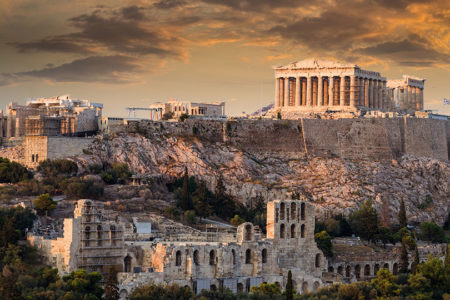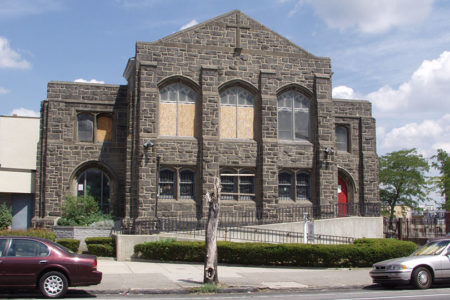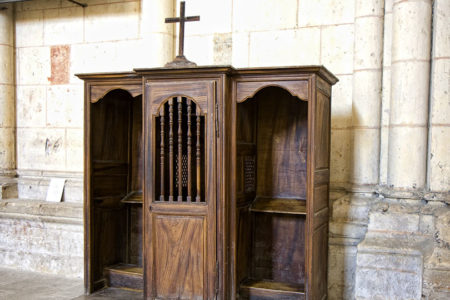A Better Sacrifice, A Better Covenant
Hebrews 8-10
It was the last Passover meal Jesus would celebrate with His disciples before His crucifixion. And as they ate, Jesus took a cup, gave thanks, and said, “This is my blood of the new testament [covenant], which is shed for many for the remission of sins” (Mt. 26:28). Just how much the disciples understood of this prophetic pronouncement is uncertain. However, it would soon become clear as they witnessed Jesus’ sacrificial death on the cross and remembered His words over the cup. It was through His death and shed blood that Jesus established a New Covenant that would change the course of human history for both Jew and Gentile.
A Superior Sacrifice for Sin
Day after day a Levitical priest stood in the Temple and offered animal sacrifices for the atonement of sin, as set forth in the Mosaic Law. The Law, with its sacrificial system, only foreshadowed what Jesus would accomplish through His death on the cross. The book of Hebrews illustrates in two ways the Levitical sacrifices’ inability to remove sin. First, if a sacrifice for sin had perfected the worshiper who offered it, there would have been no need to repeat it (10:2).
Second, if the Israelites truly had been purged from sin through animal sacrifices, there would have been “no more consciousness [sense] of sins” (10:2). However, none of their sacrifices could make them perfect or free them from a sense of sin (9:9). Why? “For it is not possible that the blood of bulls and of goats should take away sins” (10:4). Animal blood had no power to provide redemption; the ritual slaying could only purify the flesh, that is, provide ceremonial cleansing (9:13).
In bold contrast, the book of Hebrews explains how God provided a better sacrifice for mankind’s redemption. God the Father sent Jesus His Son to become a sacrifice for sin. With full involvement rather than passive endurance, Jesus entered into the work of redemption and became a sacrifice for sin. Thus Christ, in obedience to God the Father’s will, gave His body as a once-for-all offering, enabling man’s sin to be removed (10:5–10). The conclusion is self-evident: God took away the first animal sacrifice that He might establish the second sacrifice in Christ’s death.
How does Christ’s priesthood differ from the Levitical priesthood?
Under the Old Covenant, hundreds of Levitical priests repetitively offered ineffectual sacrifices that could “never take away [utterly remove] sins” (10:11); but Christ’s once-for-all sacrifice removed sins. Aaronic priests continually offered sacrifices for sin; Christ sacrificed once for sin. Aaronic priests sacrificed animals; Christ offered Himself. Aaronic sacrifices only covered sin; Christ’s sacrifice removed sin. And the Aaronic priest’s sacrifices ceased; Christ’s sacrifice is efficacious forever. Hence, Christ is now seated “on the right hand of God” (10:12; cf. 1:3; 8:1; 12:2), showing that He has obediently completed His work and been elevated to a position of power and honor.
Christ, the once-for-all superior sacrifice, is the only sacrifice left for sin today. Those rejecting Christ’s sacrifice have three charges against them: (1) They despise Christ by trampling Him under their feet. (2) They regard the blood of Christ as worthless and unholy (common). And (3) they insult the Holy Spirit, who tried to draw them to Christ (10:29). Those rejecting His atoning sacrifice are considered adversaries. Adversaries under the Mosaic Covenant suffered judgment and died without mercy. Consequently, people who reject Christ await the fearful judgment of God (10:30–31).
Through His death, Jesus inaugurated a “new and living [life-giving] way” (10:20) for people to come into God’s presence with “boldness [confidence]” (10:19). Thus Christ’s superior priesthood and superior sacrifice make the New Covenant possible.
A Superior Covenant for Saints
Hebrews reveals that Christ is “the mediator of a better covenant, which was established upon better promises” (8:6). It is more excellent because the promises of the Mosaic Covenant were conditional, earthly, fleshly, and temporary; but the New Covenant promises are unconditional, spiritual, and eternal.
What are the differences between the Old Covenant and the Abrahamic Covenant?
God entered into the Mosaic (Old) Covenant with the nation of Israel at Mount Sinai. This covenant was not the first one God made with mankind, but it was the first one He made with Israel as a nation. The Mosaic Covenant was written 430 years after the Abrahamic Covenant and did not alter, annul, or abrogate the provisions of the first (Abrahamic) covenant (Gal. 3:17–19), which was unconditional, irrevocable, and everlasting.
Many people today confuse the Mosaic Covenant with the Abrahamic Covenant and claim that the Promised Land no longer belongs to the Jewish people because the nation lost it due to sin. However, God guaranteed Israel permanent ownership of the land, not through the Mosaic Covenant but through the Abrahamic Covenant (Gen. 15:7–21; 17:6–8; 28:10–14).
The Mosaic Covenant promises were conditional. The prerequisite was that Israel obey the commandments in order for God to fulfill His covenant promises to bless them (Ex. 19:5). But Israel failed to keep the covenant’s provisions. The fault was not with the Law, for the commandments were “holy, and just, and good” (Rom. 7:12). The fault lay with mankind’s sinful nature, which rebelled against the conditions stipulated in the covenant. The covenant itself was limited in power and could not impart spiritual life or righteousness to sinners (Heb. 8:7–9).
With whom did God make the New Covenant?
Scripture makes it clear that the New Covenant was made exclusively with Israel (the physical descendents of Jacob)—not with the church (Heb. 8:10). Nowhere in Scripture has the church ever been called Israel or “spiritual Israel,” as some teach. It is clear from Scripture that the national, spiritual, and material provisions promised in the New Covenant will be fulfilled with literal Israel during the coming Kingdom Age (Jer. 31:31–40).
The New Covenant provision was first prophesied by Jeremiah six centuries before Christ (Jer. 31:31; cf. Heb. 8:8). Six times in the New Covenant God said, “I will” (8:8, 10, 12), meaning He will fulfill the covenant’s provisions. And its fulfillment depends solely on the integrity of God, not on the faithfulness of Israel.
If the New Covenant was not made with the church, why was it presented in Hebrews 8?
The writer of Hebrews was moved by the Holy Spirit to quote the New Covenant to point out the Mosaic Covenant’s failure and to show Israel that the promises incorporated in a better covenant await through Jesus Christ. The New Covenant was instituted at the Lord’s death (9:16–17), and the disciples ministered its concepts to the nation of Israel (2 Cor. 3:6). Israel’s national rejection of her Messiah resulted in a postponement of the covenant’s fulfillment; its complete fulfillment will come when all Israel receives Christ at His Second Coming.
What does the New Covenant promise?
First, the New Covenant provides an inner change of mind and heart that can only be produced through spiritual regeneration. God said, “I will put my laws into their mind, and write them in their hearts” (Heb. 8:10). The former covenant was external, engraved in stone (Ex. 32:15–16); the New Covenant is written “in fleshly tables of the heart” (2 Cor. 3:3) through the Holy Spirit’s ministry. This aspect will take place for Israel as a whole at Christ’s Second Coming, when God will pour out His Spirit on unsaved Jewish people, bringing about their repentance from sin and acceptance of Jesus as their Messiah (Zech. 12:10; Rom. 11:26).
Second, the Mosaic Covenant provided for the religious leaders alone to be taught the legal concepts of the Law with its complicated rituals and regulations. Those living under the New Covenant provisions are taught by the Lord through the indwelling Holy Spirit. They are empowered to walk in the way of the Lord and keep His statutes (Ezek. 36:27).
Third, under the former covenant there was a continual remembrance of sin each time an animal sacrifice was offered (Heb. 10:3). Under the New Covenant, Jesus was the sacrificial Lamb who, once and for all, took away sin (Heb. 10:15–18) through His blood of the New Covenant. The Lord said, “I will be merciful to their unrighteousness, and their sins and their iniquities will I remember no more” (Heb. 8:12; cf. Jer. 31:34). The words no more are a double negative in the Greek text, meaning “no, never, under no condition” will God remember the sins of redeemed Israel.
Fourth, Christ is the Mediator of the New Covenant (Heb. 9:15–20). A mediator acts as a middleman or go-between to intervene between two parties of differing backgrounds who desire to come into covenant relationship. Mediators set aside their own interests for the sakes of the parties involved in the mediation. A mediator must be trustworthy, acceptable to the parties involved, and able to secure a covenant. Through His death, Christ became the Mediator of the New Covenant; and He has made reconciliation possible to all who put their trust in His atoning work on their behalf.
His mediation also reaches back to the saints under the Old Covenant as well as extending to those who will believe in the future. Christ bestows an eternal inheritance on all believers through the New Covenant. A bequeathal can be legally acquired only on the death of the one who bequeathed it. For the New Covenant to take effect and legally bestow salvation to sinners, Christ had to die (Heb. 9:15–17).
Even the Mosaic Covenant had to be inaugurated with blood to be effective. Moses mediated the first covenant by taking the book of the covenant; reading it before the children of Israel, who agreed to keep its precepts; then sprinkling both the book and the people with blood (Heb. 9:19–20). The Old Covenant, being dedicated with blood, showed that the sacrificial death of an innocent victim was required to consecrate and establish a covenant. That covenant was only a type and shadow, looking forward to the day when Christ would consecrate and establish a New Covenant through His shed blood. And He alone can mediate the New Covenant between God and mankind (1 Tim. 2:5).
The New Covenant, unlike the Mosaic Covenant, is eternal. The Lord said, “I will make a covenant of peace with them; it shall be an everlasting covenant with them” (Ezek. 37:26). After serving its purpose, the Mosaic Covenant became inoperative. The words old, decayeth, and groweth old (Heb. 8:13) show that the Mosaic Covenant was worn out, antiquated, waning in strength, and ready to be dissolved.
Although the New Covenant was made with Israel and not the church, Christians have been granted the extraordinary privilege of experiencing certain provisions of the New Covenant that were inaugurated when Jesus Christ shed His blood on the cross. Today the church enjoys the spiritual blessings of salvation found in the New Covenant. The physical blessings in the New Covenant will be fulfilled with Israel in the Millennium. Those who follow Christ are “ministers of the new testament [covenant]” (2 Cor. 3:6) and called to spread the message of salvation. Praise God for so great salvation!






